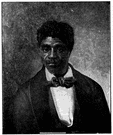The Election of 1860
The North and South had continued to be at odds for a generation or two about how to cope with the growth of slavery in the South. The agriculture industry in much of the South relied heavily on slave labor, and Southerners didn't want to lose what for them was a relatively cheap source of manpower. Also at the forefront was the moral debate, about whether it is was right for one person to enslave another. This debate happened more frequently in the North and in Congress than it ever did in the South, but it occurred there as well.
The Democratic Party split in that year, with Douglas championing the Northern half of the nation and John C. Breckinridge carrying the standard for the Southern Democratic Party. John Bell was the nominee of the recently formed Constitutional Union Party. And the also recently formed Republican Party nominated, in a surprise to many political veterans, a Congressman from Illinois, Abraham Lincoln, who had gained fame in his loss in a run for the Senate, for which he had engaged Douglas in a series of debates.
Things would get much worse before they ever got better, but the presidential election of 1860 produced as President the man whom many historians consider the best and most effective chief executive ever. |
|
Social Studies for Kids
copyright 2002–2026
David White

 The
The  With the Democratic Party split in two, many people thought that a loss for the party was inevitable. Still, the popular votes in many Northern states were closer than they might appear given the eventual electoral outcome, which handed the presidency to Lincoln. The result was a nearly immediate secession by first South Carolina and then a huge handful of other Southern states.
With the Democratic Party split in two, many people thought that a loss for the party was inevitable. Still, the popular votes in many Northern states were closer than they might appear given the eventual electoral outcome, which handed the presidency to Lincoln. The result was a nearly immediate secession by first South Carolina and then a huge handful of other Southern states. 
